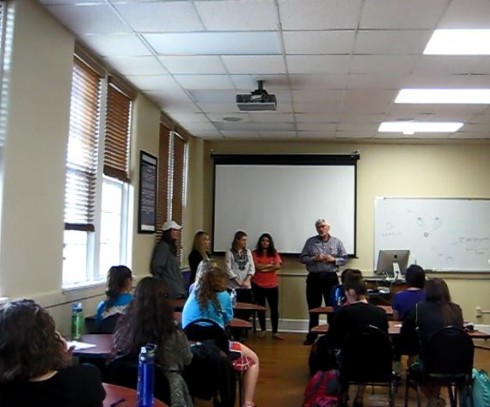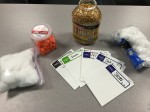What do these things in the picture have in common?
In honor of National Occupational Therapy Month and Careers in Aging week, the Pruett Gerontology Center along with volunteer students in the Gerontology Department and Sigma Phi Omega, presented an inter-departmental, interdisciplinary, formal learning opportunity known as the Aging Simulation. OT students at ACU participated in the Aging Simulation.
The objectives of The Aging Simulation are 3-fold:
1. Differentiating between social myths and realities of aging within the United States society.
2. Understanding the aging population through personal experience and personal involvement.
3. Including faith and learning task through learning the conceptual perspective that aging is part of God’s plan for his creation.

Dr. Pruett and GERO Student Volunteers (from left) Jordan Moore, Natalie Hudson, Addie Rich, and Dani Canela speak to ACU OT students during The Aging Simulation
The Aging Simulation is a transformative experience because students see through a social justice lens how the aging population experiences life and how they are treated by the general population. Aging is more than just confronting and adjusting to the effects of loss. Frames of reference for students expand as they learned empathy, strength, and resilience-based approaches. This activity echoes George Hein’s supposition that tranformative learning occurs when the mind is engaged in experiences of “cognitive uncertainty” that challenge previously held beliefs in environments that are structured yet open enough for real discovery and exploration.
Ongoing post research discovery and reflection between PGC and the Occupational Therapy department continues.
Special thanks to our GERO student volunteer activity directors, Dani Canela, Hayley Griffin, Natalie Hudson, Jordan Moore, and Addie Rich.
~~~
Hein, G.E. (1998) Learning in the Museum (New York: Routledge, 1998), p. 38.

